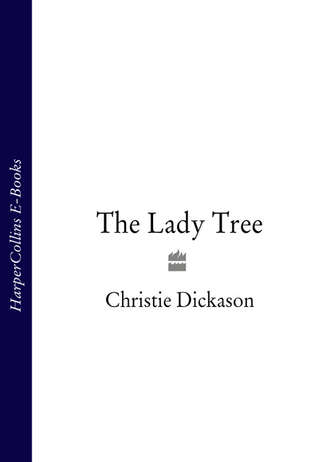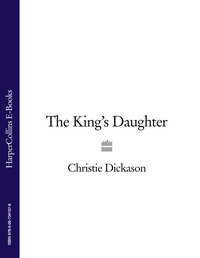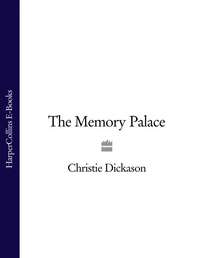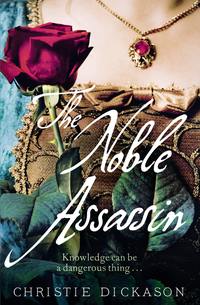
Полная версия
The Lady Tree

CHRISTIE DICKASON
The Lady Tree

FOR MARJORIE, MY MOTHER,
WHO MADE THE FIRST GARDEN IN MY LIFE
Contents
Cover
Title Page
Part One
Prologue
One
Two
Three
Four
Five
Part Two
Six
Seven
Eight
Nine
Ten
Part Three
Eleven
Twelve
Thirteen
Fourteen
Fifteen
Sixteen
Seventeen
Acknowledgements
Keep Reading
Author’s Note
About the Author
By the Same Author
Copyright
About the Publisher
Prologue
Majestic Wealth is the holiest of our gods.
Juvenal.
AMSTERDAM, FEBRUARY 1636
The room glinted with brass and gold but smelled of damp wool, nutmeg, cloves, sewage and burning fat. In the dim yellow light of thirty tallow candles held aloft by gilt fantasies of mermaids and dolphins, three men waited in uneasy silence. The Englishman, who looked pastel, insubstantial and overfrilled beside the two black-clad Dutchmen, peered down from an open window into the cavern of shadow beneath the massive bow of a moored ship. Although he stood in a house on dry land, the dark rim of the window seemed to shift. The floor tilted. The fat tree-trunks of the ship’s masts, tops far up out of sight in the night sky, swayed almost imperceptibly, not quite close enough to touch. He swallowed against the ghost of nausea that tickled his stomach unpleasantly.
Ships rubbed and shouldered each other for dock space as far as he could see to either side. The small red eye of a watchman’s lantern etched a slow path through the black, gently heaving thickets of spars and rigging.
I should have refused to come, he thought. Made them send someone weighty enough to decide such things.
But he knew that he had been sent precisely because he was unremarkable. The men who made the decisions paid men like himself to take the risk of looking like an ass. He shifted aching shoulders inside his doublet and cursed the damp.
Anyway, he couldn’t afford to refuse a commission.
The house stood on a dock on the Amstel River. The moored ships creaked and scraped. A far-away sailor shouted to another. On the dock just below the window the shadow of a dog nosing among the stacked bales, barrels, and coiled ropes suddenly erupted into a frenzy of barking. The three men inside the room lifted their heads.
In another room of the house, a bad-tempered viol was groaning and complaining again and again through the same four phrases of a French dance tune. The barking stopped.
‘Not yet.’ Vrel, one of the two Dutchmen and the owner of the house, settled his bulk back into his carved and gilded chair. He sat squarely at the end of a long heavy table as if he expected a dish of roast meat to be set in front of him, but diamond and ruby rings flashed uneasily in the candlelight as his short, strong fingers opened and closed over the lions’ masks of the arm ends.
Simeon Timmons, the Englishman, now eyed his host. An agent had to be civil to everyone, but Timmons was struggling with Cornelius Vrel.
A mannerless frog in black silk and fine wool stolen from the English, or near enough stolen, thought Timmons viciously. Hunkered down here smugly among his gold plates and drinking cups, his Toledo blades, Venetian candle-holders, and Turkish rugs that covered every flat surface like a plague of multi-coloured moss. Stinking of the spices that had made him rich.
His stomach contracted with a pain like hunger. How he lusted to be such a frog!
Timmons lived to serve other men’s wealth. As a third son with two healthy older brothers between him and the family money and lands, he had to live on his wits. He fed and supped on envy and hope to sustain himself in the hard but necessary work of being civil at all costs. Even to former enemies who now smiled and allowed you to admire booty pirated from English ships. No matter that Dutch and English merchantmen were at this moment blowing each other out of the East Indian seas for the sake of cinnamon and cloves. No matter an uncle massacred by the Dutch at Amboyna thirteen years before. Civil and smiling, Timmons made a career trotting to and fro like a market pony, laden with information, propositions, money, documents, promises or silver spoons.
The third man in the room asked a question in Dutch.
Timmons turned to study him with carefully neutral eyes. Named Blanket or Banquet or some such Dutch torturing of vowels, in his late fifties, a little older than Vrel, a head taller but half the weight. As they waited, he had been strolling aimlessly around the room.
Busy coveting the Chinese porcelain and gilt plates, thought Timmons. He heard the anxiety now in the man’s voice and wished he could understand the question.
Vrel replied in a voice as chilly as the night air. Blanket (or Banquet) sank his skinny neck and long head back into his shell of black merino and Brussels lace. He turned away to study a set of golden spice scales.
Whatever it is, thought Timmons, Vrel is firmly in control. He shivered. His fine, light-brown hair lay damply clumped against his narrow head. His long thin face slid unchecked down sagging light-brown moustaches and a small pointed beard. A newly-fashionable flat collar drooped limply over narrow shoulders which were betrayed by the new, unpadded style of English doublet. His lace tie, lace cuffs and lace boot tops had all lost their starch in the damp sea air. A more confident man would not have left his wool cloak at his lodgings in the name of fashion.
An ecstasy of barking erupted on the dock.
Vrel was already on his feet. ‘He’s here. Follow my lead, Blankaart!’ he ordered. ‘Listen to me very carefully. Don’t let your enthusiasms run away with my money …!’
A commotion mounted the stairs outside the room. On the dock, the dog still barked.
The newcomer blew into the room like a storm at sea, brushing aside the servant who had brought him up, bellowing words of greeting, his wide hat and cloak flapping, the soft barbs of a scarlet feather in his hat quivering like a virgin’s knees. Timmons took a step back towards the safety of the wall.
‘Mynheer Vrel…Cornelius!’ The man clasped Vrel’s large hand with one even larger. He slapped at Vrel’s upper arm, rustled his lace cuffs, shook his beard and flashed white, white teeth. ‘If you ever want to deal in secret again, roast that dog!’
Vrel pulled himself out of the maelstrom. ‘Have you left a man on watch?’
‘Who do you think is being eaten down there now?’ The newcomer focused on Timmons the suddenly still eye of the genial storm. ‘… And is this your speculatory Englishman?’
Timmons stiffened at the tone and cursed the ugly, unintelligible foreign words.
‘A mere envoy from the English merchants, chasing after the Dutch lead as always,’ said Vrel. ‘He won’t say how much they can afford to invest.’ He switched to English. ‘Mr Simeon Timmons, this is Mynheer Justus Coymans.’
Coymans raised his wide-brimmed hat to the Englishman and switched to English also. ‘Mynheer Timmons. You’re a man of genius to come to Holland at this time to do business!’
‘To see if there is any business here worth doing,’ said Timmons, more stiffly than he intended. He stayed well out of Coymans’s reach.
‘No fear,’ said Coymans. ‘There’s no business like it in the world. Forget the Caribes and the Indies! I shall make you as rich as your English king would like to be.’
Timmons’s long face sketched a polite smile below its waterline of moustache. ‘As I’m not privy to his Majesty’s ambitions,’ he said, ‘that tells me nothing.’
‘Rich enough to build a fleet of new ships to wipe the Spanish off the seas,’ said Coymans cheerfully. ‘And the Dutch.’ His teeth showed in the candlelight; his eyes were hidden by the shadow of his hat.
‘Amen to the Spanish.’ Timmons hesitated. But there was now altogether too much self-satisfaction in the room. He could not resist the lightest of slaps. ‘But I believe that our two countries are supposed to be at peace.’
‘Ignore politics! They exist only to serve trade.’ Coymans snatched off his short cloak and tossed it to the servant. ‘Let me show you something more powerful than cannons, more intoxicating than a religious war.’
He seated himself uninvited in Vrel’s chair at the head of the long table. From his pouch he took a linen-wrapped parcel which he placed with a flourish on the rug-covered table in front of him. He raised both hands like a wizard poised to enchant and looked up at Vrel.
‘Cornelius. Voilá! Ecco! Mira! The new Indies here on your own table!’
Timmons winced at the theatrical excess and peered sceptically through the dim yellow light at the dirty little parcel. He felt the budding of ass’s ears begin to prickle at his scalp.
‘The Admiral den Boom,’ said Coymans, and waited for cheers and applause.
Vrel didn’t move closer to the table. ‘How much?’
Coymans flashed his teeth at Timmons. ‘I hope your English clients are more fun to deal with. Cornelius here has no taste for the flourishes that make work into fun. “How much?” he asks. Just like that! Clunk! When I hadn’t even finished telling him the whole wonderful story.’
‘So tell it,’ said Vrel. Coymans was right – he had little patience with whimsy. He went straight for the adding, the subtracting and, most vital of all, the multiplying.
‘My Admiral here is a miracle,’ said Coymans, still including Timmons in the blast of his focus. He dropped his voice to a dramatic stage-whisper. ‘He fathers his own offspring without a mother! Would that we all could…think of the strife it would save mankind!’
He’s going to wink now, thought Timmons with alarmed distaste.
Coymans winked. ‘And I have brought Mynheer Vrel the pater and two sons.’ He leaned forward and hooked his audience more firmly with sharp chilly eyes. ‘One son more than God the Father Himself!’
Then Timmons saw the irony behind the chill and felt an uneasy respect. Here was a performer of far greater range and subtlety than himself.
‘Like a good pimp, I have brought more than asked for but not more than is desired.’
‘You have brought me three Admirals?’ The pitch of Vrel’s low steady voice climbed at least two tones.
Coymans let a beat of silence cut through the candlelight. ‘The only three in the world.’
‘Impossible.’
‘I made sure of it.’ Then Coymans added a few swift sentences in Dutch.
Whatever he said shifted the set of the muscles in Vrel’s face. The merchant walked to the open window and pretended to look out. He was close enough for Timmons to hear how fast and shallow his breathing had become.
‘One thousand florins,’ said Vrel.
Timmons understood that much.
‘Ptsh,’ said Coymans sadly. He drew his knife and cut the leather thongs around the parcel. He laid the knife on the table, then delicately, precisely, unfolded the linen cloth. In its centre lay an irregular egg of dried grass tied with reeds. Coymans cut these bindings. With large-knuckled, reddened fingers he probed the grass, parted it tenderly and pressed it aside. Then he leaned back in his chair.
In spite of himself, Timmons moved closer.
Three onion-like bulbs lay in the grass nest. Each was cased in a papery skin the colour of chestnuts and bearded at its base with a fringe of dried white roots.
Timmons was shocked by how ordinary they looked. Coymans had somehow persuaded him that there really was something wondrous in that packet. Timmons had begun to persuade himself that he wouldn’t have to tell the obvious truth when he returned to London – that the Dutch had gone mad and there was no salvation there for the desperate Englishmen. Now the prickling on his scalp grew more insistent.
One thousand florins for those…onions!
Coymans lifted one bulb out of the nest into the candlelight, his red fingers as gentle as if it were a phoenix’s egg. ‘Ecco! Look there!’ He placed a blunt red finger lightly on two tiny, tooth-shaped bulblets just above the union with the roots. ‘Two more infant Admirals, which will grow to blooming size in three short years. Then there will be five true Admirals, all of the same unadulterated substance. Not a rich man’s original and four cheap copies for hoi polloi. What other commodity can perform this magic?’
When Vrel did not answer, Coymans interrogated Timmons. ‘Can gold multiply its true self? Or a porcelain jar? Or a painting?’
Timmons shook his head in helpless assent.
Vrel collected an arrangement of dolphins and mermaids from a sideboard and carried the extra light to the table. ‘Blankaart!’
Blankaart leaned forward over the table and extended his wrinkled neck out its lace collar. ‘May I?’ He picked the largest bulb from the nest and sniffed it. Then he held it close to the candles, turning it in his fingers. ‘Tulipa,’ he announced at last.
Coymans blew like a surfacing whale. His moustaches heaved upward on the force of his irritated breath. ‘Of course it’s a tulip! I don’t trade in turnips! Vrel, can’t your tame botanist do better than that?’
‘Probably not the common Turkish type,’ continued Blankaart resolutely, with one eye now on Vrel. ‘It’s darker and a little longer from base to nose. But an Admiral den Boom? Hard to say without seeing it in bloom.’
‘It’s more expensive to buy in bloom,’ said Coymans to Vrel. ‘Buy now, in the dry. The advantage will be yours when you sell again.’
‘Blankaart?’ demanded Vrel. ‘What’s your advice?’
‘If you buy now, you must trust your dealer.’ Though Blankaart’s voice was flat, his botanist’s hands cradled and caressed the smooth chestnut-coloured shape.
A bad actor, thought Timmons. No help to Vrel. In all my ignorance, I could serve better than that.
Coymans’s teeth showed briefly in the shadows of his moustaches. ‘A cheat can sell only once. I intend to last in business till I’m old as Methuselah.’
‘I’ll agree a price now but wait till the thing blooms before I pay you,’ said Vrel.
‘Then I’ll sell tomorrow in auction in the collegium, as I am bound to do by law,’ replied Coymans. ‘I’m only risking a private sale because you asked it.’
Vrel made a small nervous swing back toward the window. ‘Add four barrels of nutmegs, and seven bales of wrought silk.’
Coymans laughed. ‘For three? And two offsets? Think what you would have to pay for three bulbs of Semper Augustus! Ten times that. And the flames of the Roman emperor are a tiny candle next to the meteor of our own Dutch sailor!’ He turned to Blankaart. ‘Is that true or not, high priest of things botanical?’
Blankaart swallowed audibly and looked at Vrel. ‘The true Admiral is a very rare bloom…if you can be sure of him. That is the problem. Being sure.’
Vrel sent a dragon’s jet of rage toward his perfidious ally.
‘The Semper Augustus has become a whore with too many masters,’ said Coymans. ‘And too many little bastards. You alone in Holland would rule our Admiral.’
‘I’m not a washerwoman or streetsweeper,’ warned Vrel, ‘who’ll give my life savings to some tavern rogue in exchange for an onion.’
‘And I’m not a Batavian spice farmer who will accept any price you offer just because your company has a big ship with four hundred guns on it.’
There was a pause.
‘Tch,’ said Coymans. His moustaches danced like playing dolphins. His teeth appeared and disappeared. ‘Oh, Vrel …!’
‘You’ve heard my last offer. One thousand florins, the nutmegs, and the silk.’
For a second, Coymans did not move at all. Not a hair, nor ruffle, nor swag, nor fold. Not a moustache. Not a finger. Then he held out his hand. ‘May I have that bulb back?’ he asked Blankaart politely.
Blankaart returned it with treacherous reluctance.
‘How can I raise your value?’ Coymans enquired of the bulb. ‘Tch.’ One moustache arched briefly. He dropped the bulb onto the floor and stamped on it with his boot.
Blankaart gave a strangled yelp of protest.
Coymans stamped again, and ground his sole against the polished wooden floor. He held his boot aloft and peered past it at the white mess on the floor. Then, with his knife, he scraped the rest from the sole of his boot.
‘Only two left in the world now,’ he said cheerfully. ‘And the two infants. We must rethink things a little.’
In the silence, Timmons noticed that the bad-tempered viol had stopped. A nearly-guttered candle on the table sang a high, tiny note. Blankaart coughed.
After a long moment, Coymans pushed the grass nest along the table to Timmons. ‘While our friend thinks, would you like to hold a fortune in your hand? Feel for yourself the weight and texture of true wealth?’
Timmons hesitated.
‘Go on. I trust you.’
Timmons crossed to the table and picked up a bulb. He turned it curiously in his thin hand. He was only an agent, not one of your gentleman enthusiasts, had never handled such a thing before. Smooth and shiny, like satin against his thumb. Hard under its crisp papery skin, with grey scarring around its neck like a hanged man.
It could just as well be an onion, he thought. How can anyone tell?
He had never before in his life thought about tulips, and certainly not in the same way as spices, or coal, or Baltic grain and oak. He weighed it in his palm.
‘Vrel?’ asked Coymans.
Vrel still stared at the juicy pulp on his floor. He was breathing heavily now.
‘Vrel?’ Coymans plucked the last bulb from the grass nest – the one with the two offshoots – and dropped it on the floor. He raised his boot.
‘No!’ cried Blankaart. ‘Please!’ He dropped to his knees and snatched at the tulip bulb. ‘Ough!’ He grunted as Coymans’s boot pinned his hand against the floorboards.
‘Wait!’ Vrel wrapped himself with his thick arms and rocked in an agony of indecision. ‘This house…and its contents.’
‘Not enough.’
Vrel pulled a spark of red fire from a finger of his left hand and dropped it on the table in front of Coymans. Then a chip of ice. ‘Let me think!’ begged Vrel. ‘I was prepared only for one…Only expected to pay…Just give me a moment to think!’ He added a band of gold and a cold tapestry of pearls to the other rings in front of Coymans.
Coymans leaned over and picked the bulb up from the floor. He put it back into the nest, crossed his arms and waited, with his eyes on Vrel’s face.
In the following silence, an extraordinary thing happened to Simeon Timmons. The chestnut-coloured tulip bulb in his palm began to change from the ordinary piece of vegetable matter which a few seconds before he could think of only on a slice of bread. First it grew heavier and heavier in his hand, until it was as heavy as the high stacks of bales on the wharf. Heavy as a ship’s load of barrelled nutmegs and pepper. Heavy as the wood and stone and brick from which men build palaces. As heavy as gold.
The shiny chestnut skin grew translucent. In the heart of the bulb, Timmons saw the growing glow of the ruby ring, the diamond, and the pearls. And deep among all these fires flickered the small glints of greed in the eyes of Cornelius Vrel. In his hand, Timmons held possibility. For the men in London. And for himself, perhaps, at last.
Only a few years earlier, all the riches of the East Indies had been mere possibility. Travellers’ tales. Speculative dreams. Then brave men, with wit, patience and imagination had turned possibility into the reality of ships, spices and empires.
They sent me from London to assess possibilities, thought Timmons. Am I brave enough to tell the Company to forget Baltic grain, Chinese porcelain kraacke-ware, nutmegs and gold? For the possibility I am holding in my hand? For onions?
One
HAWKRIDGE HOUSE, HAMPSHIRE, 1636
May 22, 1636. Sun at last. A sad cold night. Hot bed cucumbers in bud under handglasses. First swallow. Too much to do before Eden opens her gates. The Serpent stirs.
Journal of John Nightingale, known as John Graffham.
At fourteen he had been dangerous. At twenty-six, he feared, he had become merely reliable.
John crunched across the gravel forecourt of Hawkridge House in long angry strides, scattering geese and speckled goslings. A yellow cur from the stable yard trotted purposefully after him with its nose stuck to his heavy work boots to read his morning of horse, herb, pigeon and pig.
John stopped abruptly and glared over the high brick forecourt wall. In two days, even reliability would be stripped from him.
‘Heads down, lads,’ muttered a man with a rake.
Fourteen men and women, cottagers and workers on Hawkridge estate, watched him sideways as they weeded, raked and polished.
‘Poor man,’ said a young weeding woman under her breath. She hoiked a plantain rosette out of the gravel of the forecourt with a stubby knife and tossed it into a wooden trug.
‘Poor us,’ said her companion who squatted beside her in a crumple of woollen skirt. She uprooted a hawkbit. ‘He’s family. He’ll be all right.’
The two women waddled their bunched skirts forward like a pair of geese to attack a young colony of Shepherd’s Purse.
‘He’ll see us all right too,’ said the first woman.
‘… if he’s here to do it.’
They twitched their goosetail skirts forward again, eyes still on the dark, curly-haired, bearded storm which had blown itself to a brief stop in the centre of the forecourt. What would the Londoners make, they wondered, of a gentleman with such brown hands and arms, who wore coarse linen shirts rolled to the elbow and a leather jerkin? Each then looked down into her private fears. Change was almost never good.
John’s black brows, as delicate as a woman’s, dived fiercely together over a long, fine but slightly skewed nose. Light grey eyes gave him a wolfish look. A labourer who was oiling the iron forecourt gates turned uphill towards the road to see what had caused that grey-eyed rage, but he pursed his lips, puzzled. Beyond the forecourt wall, the avenue of beeches that curved down from the road to the house rustled peacefully with sea-green early leaf. High up, near the road, a cottager swung his scythe through the long grass, wild campions and meadow cranesbills. A spotted flycatcher dropped from a beech into the grass. Sheep munched.
The yellow cur waited a moment, then sat and pressed its muzzle against the man’s thigh. John’s brown hand stroked absently. The dog brushed the gravel with its tail. It sighed with delight. The man did not usually stand still for so long.





